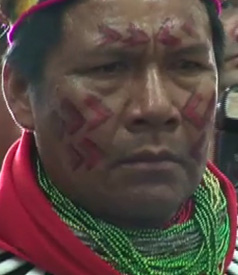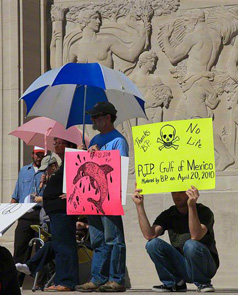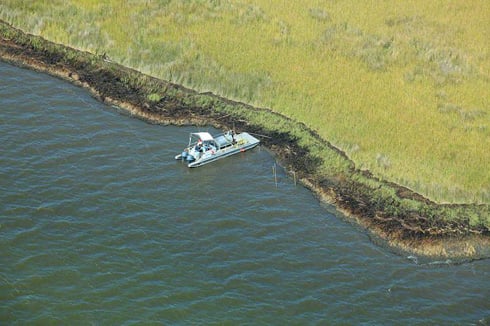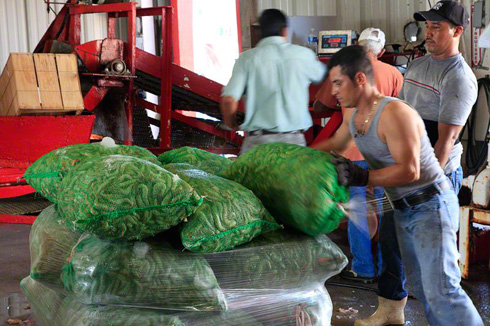Lessons from Gulf spill slipping away
- February 13, 2011 10:29 am
A once-in-a-lifetime opportunity to study how the BP oil disaster affected the Gulf of Mexico is vanishing, with political infighting and bureaucracy tying up hundreds of millions of dollars in grants promised to independent scientists months ago.
Repeated postponements, a shortage of equipment and a lack of information from the group responsible for doling out the money have undermined research in the crucial first year after the disaster. The lag may make it impossible to fully understand the oil spill’s impact on the Gulf ecosystem, scientists said.
“Oil is a moving target; with every day of passing time, we get further and further from the acute effects of the oil and it becomes harder and harder to trace those effects,” said Ian MacDonald, a biological oceanographer at Florida State University in Tallahassee.
From late last April to mid-July, the blown BP Deepwater Horizon rig spewed 186 million to 227 million gallons of crude into the Gulf, adding up to the world’s largest peacetime oil spill. BP also doused the Gulf with at least 1.8 million gallons of chemicals to disperse the crude.
Last May, in the midst of the disaster, BP promised $500 million for a decade of Gulf research – enough to give the ecosystem unprecedented scrutiny.
Almost immediately, however, Gulf-area politicians – former Gov. Charlie Crist was among them – demanded control of the money, aiming to keep it in their states.
Since then, only $40 million has been given out. Scientists eager to find where the oil went, how it moved through the food chain and whether the chemical dispersants did more harm than good may remain idle if more money is not disbursed soon.
A new 20-person board that controls the grant money has yet to produce a research plan or even begin asking scientists to submit proposals.
Meanwhile, scientists say important data is slipping out of reach because too few researchers can get in the field to study the spill.
“It’s not that nothing has been done. It’s a matter of the breadth of the work,” said Christopher D’Elia, dean and professor at Louisiana State University’s School of the Coast and Environment.
In Barataria Bay, Louisiana’s most oil-slimed estuary, scientists are monitoring changes in the ecosystem, including water chemistry, wetland plant growth, erosion, and oyster and crab abundance.
Delays could make it more difficult to tie future problems, such as a potential crash in bait fish, to the spill.
“A number of people are worried that we are going to miss getting out in the field in the strengths and numbers we need to,” D’Elia said.
That problem is compounded by a shortage of research ships. “Are we supposed to go out in row-boats?” MacDonald asked.
The delay has already caused a gap in coordinated, long-term research that could hamper our understanding of the spill, said Bob Gagosian, president and CEO of the Consortium for Ocean Leadership, a nonprofit that manages grants for ocean research equipment.
Data collection needs to be consistent to get the best long-term results. Now, scientists are essentially collecting data in the dark because the board has not offered guidance on the research it wants or the standards it will require.
“We basically have lost – in a long-term, 10-year program – the first nine months,” Gagosian said.
But board chairman Rita Colwell, a public health professor at University of Maryland and Johns Hopkins University, is optimistic.
Colwell attributed the delay to the time it took to assemble the 20-person board and said the initial $40 million was enough to start significant research.
“Things are moving along extremely well,” she said.
But even under the best circumstances, it will take at least until June to fund new projects, well past the critical spring spawning season that scientists hoped to thoroughly observe this year. “Clearly we’re going to miss that because the money won’t be available in time,” said Ed Overton, an oil researcher and professor emeritus at Louisiana State University.
The political fight
Just as the BP spill was unprecedented, so was the amount of money suddenly available for research in the Gulf, a body of water that many scientists have long considered overlooked.
But the proposed windfall gave rise to some nasty politics. Gulf Coast scientists were concerned that the panel BP chose to dispense the money did not include anyone based in the area. State governors wanted the money spent in their backyards. Some politicians, worried about their budgets, even pushed to have the money diverted to their own restoration projects, D’Elia said.
The federal government got involved, too, urging BP to work with the governors, who insisted that the money go through the Gulf of Mexico Alliance – a governors’ federation aimed at improving the Gulf’s environmental and economic health.
BP and the governors agreed last September to funnel the money through the alliance and to form a research board with 10 appointees from BP and two from each of the five Gulf states.
It took until December for the alliance to incorporate, hire staff and make board appointments official.
“These appointments should have been made months ago. There shouldn’t have been this delay,” said Shirley Pomponi, council chair for the Florida Institute of Oceanography, a consortium of state research institutions and universities.
In Florida, she said, the governor’s race also created delays.
The board members, all top scientists in fields ranging from marine sciences to economic development, finally met for the first time in December.
“And of course there were the holidays intervening,” Colwell said. They have not met again, except by conference call.
Now the board faces myriad obstacles, including the need to work through potential conflicts of interest. Many of the board members head or work for institutions that will apply for grants, Pomponi said.
Despite the delay, Pomponi said governors made the right decision to get Gulf-based scientists on the board. She said she does not believe the research will suffer because scientists could tap the initial $40 million award and have sought other means of funding.
“I definitely think it was worth it because I think it brings a scientific – and quite frankly political – perspective from the Gulf state region,” Pomponi said.
Worth the wait?
Whether the wait is worth it, scientists are frustrated by the board’s lack of communication, as well as the funding lag.
Scientists were told the board would ask for research proposals in December, then January and now the end of this month.
“We’d like to get organized and we’d like to get our research plans finalized,” D’Elia said.
The board also has not said what kind of research it wants.
“We’re extremely baffled about how we should position ourselves to deliver the science that is desired,” MacDonald said.
Once the board starts accepting research proposals, it will take at least six weeks for scientists to submit applications and more time for the board to select projects to fund.
Awards are expected in June, but D’Elia said August or September may be more realistic.
Colwell indicated a desire to spread the money equally over the 10-year period, which was not BP’s original intent.
BP representative Hejdi Feick said the company planned to make awards based on the proposals that came in, not a set yearly amount.
“I don’t think at the time we were going to do $50 million a year,” Feick said.
Scientists said it makes sense, and is customary, to put more money into research the first two years after a catastrophic event because data collected closer to the event is more valuable.
MacDonald said the researchers are in “limbo.”
“It’s very odd,” he said.










